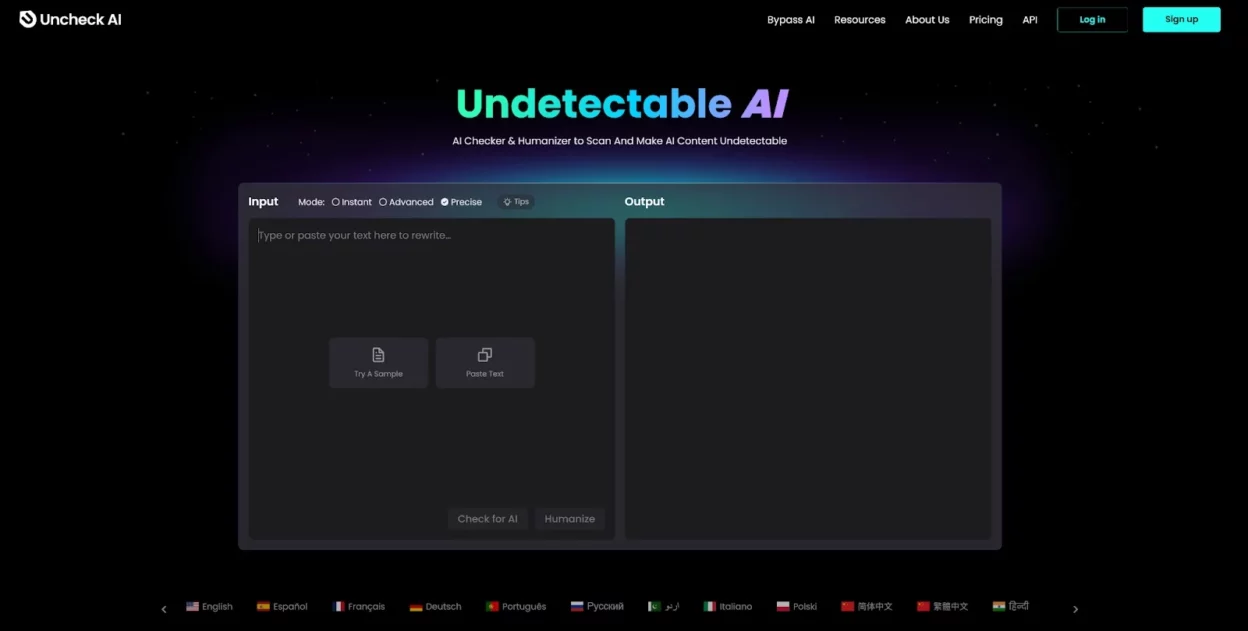Uncheck AI positions itself as a two‑in‑one solution: an AI checker to evaluate how “AI‑like” your text is, and an AI humanizer to rewrite that text so it becomes undetectable by modern AI detectors. It targets users working with ChatGPT, GPT‑4, Claude, Jasper, Copy.ai, and other LLMs, asserting it can produce fully “undetectable AI” output.
The platform’s user flow is straightforward: paste AI‑generated text, run the checker or humanizer, select a bypass mode (Instant, Advanced, Precise), and receive rewritten content within seconds.
Core Features and Strengths
1. Built‑in AI checker
Uncheck AI offers integrated scans across multiple AI detection engines—GPTZero, Originality.ai, ZeroGPT, Copyleaks, etc.—in one streamlined interface.
2. AI humanizer engine
The platform uses advanced rewriting algorithms to alter vocabulary, phrasing, structure, and syntax, designed to eliminate standard AI‑generated fingerprints.
3. Watermark removal
Uncheck AI claims to automatically remove detectable ChatGPT watermark patterns—those tell‑tale phrases and cues AI detectors learn from.
4. Modes of bypass
Users can choose among Instant (fast), Advanced (more thorough), and Precise (targeted) rewriting modes, supposedly to balance speed versus depth.
5. Multilingual and formatting support
Uncheck AI supports over 30 languages and caters to various text types—essays, articles, reports, marketing copy, etc.—claiming to preserve meaning and format post‑rewrite.
Testing Performance: Does It Truly Bypass AI Detectors?
Mixed test outcomes
- One in‑depth test by Originality.ai concluded Uncheck AI failed to fool detectors: both ChatGPT‑4 original text and its Uncheck AI‑rewritten version were flagged 100% as AI by Originality.ai and GPTZero; Writer AI did show slight improvement (80% human), but Originality.ai’s verdict remained negative.
- Intellectual Lead also reported similar failure: rewritten text scored 100% AI on both Originality.ai and GPTZero.
- Conversely, other reviews (e.g., autogpt.net, bypassai.io) claim 100% success against multiple detectors, showing human scores in scans.
Why results conflict
- Different AI‑generated samples and humanization methods can skew outcomes.
- Detectors have differing sensitivities to rewriting patterns.
- Confirmation bias may influence positive reviews; paid or affiliate‑interest articles may paint an overly optimistic picture.
- Independent tests from industry‑recognized sources (Originality.ai, Intellectual Lead) lean strongly toward failure.
Implications
While Uncheck AI might reduce detection levels in some cases, independent, rigorous testing indicates it does not reliably evade top-tier AI detectors. Users relying on it for high‑stakes content should remain cautious.
Quality, Coherence, and Potential Downsides
Common criticisms
- Reduced readability or grammar: Reviews cite weaker, more convoluted text after rewriting—less clarity and more errors.
- Over‑reliance on synonym swaps: Inadequate structural rewriting may leave AI‑like “fingerprints” intact.
- Flat tone: Rewrites can strip personality and nuance, yielding generic content.
Customer feedback (Trustpilot)
Uncheck AI has a low TrustScore (2.7/5) with highly polarized reviews:
- Negative reviews (~73%): Complaints about scammy billing, poor service, frequent rewrite errors, unresponsive support.
- Positive reviews (~18%): Some users praise ease of use and personal writing aid—especially for casual, non‑professional usage.
Considerations
Ethics and plagiarism
While Uncheck AI ensures “no plagiarism” by rewording text, rewriting AI outputs to present as original human work can raise ethical questions—especially in academia or professional content creation.
SEO and spam filters
Uncheck AI claims to eliminate “spammy” AI patterns that could trigger search penalties. However, using it extensively might attract scrutiny and algorithmic risk if content lacks human oversight.
Academic detection arms race
Recent studies (e.g., “DAMAGE”) show emerging detectors can identify adversarially humanized text. Thus, even Uncheck AI’s output is not invincible; paywalled academic integrity solutions may still flag it.
Ideal Use Cases
Potentially appropriate scenarios
- Quick rewriting for internal drafts or private use—when perfect covert rewriting isn’t required.
- Casual personal writing where minor humanization suffices.
- Users want an all‑in‑one interface for initial checks and rewrites.
When to reconsider
- Publishing high‑stakes or academic content; aim for manual rewriting and oversight.
- Bypassing AI detection in regulated environments.
- Expecting flawless output without editing—customer reviews highlight inconsistency.
Conclusion
Uncheck AI is a useful starting point for users seeking a single tool to check and humanize text quickly. It’s affordable, easy to use, and helpful for casual needs. But for high‑stakes scenarios—where detection or plagiarism consequences matter—its limitations are clear. Edits remain detectable by advanced software, output can degrade clarity, and customer experiences vary widely.
To achieve truly undetectable AI content, the safest route still lies in manual crafting—using AI only as a prompt or second‑draft aid, followed by rigorous human editing, plagiarism checks, and professional review.

Lexy Summer is a talented writer with a deep passion for the art of language and storytelling. With a background in editing and content creation, Lexy has honed her skills in crafting clear, engaging, and grammatically flawless writing.



